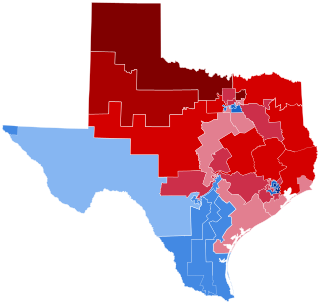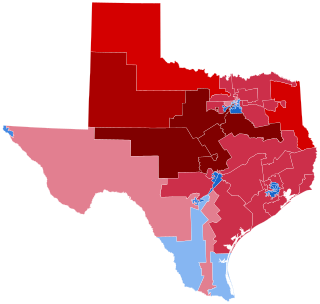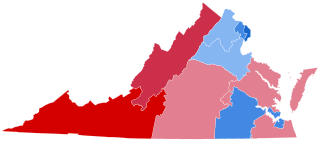
Joseph Christopher Chocola is an American businessman, lawyer, and former politician who served as the U.S. Representative from Indiana's 2nd congressional district from 2003 to 2007.
Texans for a Republican Majority or TRMPAC is a general-purpose political action committee registered with the Texas Ethics Commission. It was founded in 2001 by former Republican Texas U.S. Rep. and House Majority Leader Tom DeLay.

The 2003 Texas redistricting was a controversial intercensus state plan that defined new congressional districts. In the 2004 elections, this redistricting supported the Republicans taking a majority of Texas's federal House seats for the first time since Reconstruction. Democrats in both houses of the Texas Legislature staged walkouts, unsuccessfully trying to prevent the changes. Opponents challenged the plan in three suits, combined when the case went to the United States Supreme Court in League of United Latin American Citizens v. Perry (2006).
Americans for a Republican Majority was a political action committee formed by former Republican House Majority Leader Tom DeLay and directed by Karl Gallant. On July 7, 2006 ARMPAC reached an agreement with the Federal Election Commission to pay a fine of $115,000 for various violations and to shut down operations. It filed its termination papers on April 24, 2007.
Tom DeLay, a Republican U.S. Representative from Texas from 1979–83, and from 1985–2006 and the House Majority Leader from 2003–05, was convicted in 2010 of money laundering and conspiracy charges related to illegal campaign finance activities aimed at helping Republican candidates for Texas state office in the 2002 elections. In 2013, a Texas Court of Appeals panel acquitted DeLay when it overturned his conviction. This decision was affirmed by the Texas Court of Criminal Appeals on October 1, 2014. DeLay had three years from that date, i.e. until October 1, 2017, to file any lawsuits for wrongful action.
Robert Stephen Bickerstaff Jr. was a lawyer, legal scholar, expert on redistricting, and book author.
John Dominick Colyandro is a Senior Advisor and Policy Director for Texas Governor Greg Abbott. He is a former executive director of the Texas Conservative Coalition and the Texas Conservative Coalition Research Institute. He is also the former executive director of the political action committee Texans for a Republican Majority.

The 2012 United States House of Representatives elections in Missouri were held on Tuesday, November 6, 2012 and elected the eight U.S. representatives from the state of Missouri, a loss of one seat following the 2010 United States census. The elections coincided with the elections of other federal and state offices, including a quadrennial presidential election and an election to the U.S. Senate.

The 2012 United States House of Representatives elections in North Carolina were held on Tuesday, November 6, 2012, to elect the 13 U.S. representatives from the state of North Carolina. The elections coincided with the U.S. presidential election, N.C. gubernatorial election, statewide judicial elections, Council of State elections and various local elections. Primary elections were held on May 8, 2012; for races in which no candidate received 40 percent of the vote in the primary, runoff elections were held on July 17.

The 2012 United States House of Representatives elections in South Carolina were held on Tuesday, November 6, 2012 and elected the seven U.S. representatives from the state of South Carolina, an increase of one seat as a result of reapportionment thanks to the continued strong growth found in South Carolina as reported in the 2010 United States census. The elections coincided with the elections of other federal and state offices, including a quadrennial presidential election. The people of South Carolina elected six Republicans and one Democrat to represent the state in the 113th United States Congress.

The 2012 United States House of Representatives elections in Texas were held on Tuesday, November 6, 2012, to elect the 36 U.S. representatives from the state of Texas—an increase of four seats in reapportionment following the 2010 United States Census. The elections coincided with the elections of other federal and state offices, including a quadrennial presidential election and an election for the U.S. Senate. The primary election had been scheduled to be held on March 6, 2012, with a runoff election on May 22; because of problems arising from redistricting, the primary was postponed to May 29, and the run-off to July 31.

The 1992 United States House of Representatives elections in Texas occurred on November 3, 1992, to elect the members of the state of Texas's delegation to the United States House of Representatives. Texas had thirty seats in the House, apportioned according to the 1990 United States Census.

The 2002 United States House of Representatives elections in Texas occurred on November 5, 2002, to elect the members of the state of Texas's delegation to the United States House of Representatives. Texas had thirty-two seats in the House, apportioned according to the 2000 United States Census. The state gained two seats in reapportionment. Democrats narrowly maintained control of the Texas House of Representatives after the 2000 election after heavily emphasizing it as necessary to protect the party from a potential Republican gerrymander. During the 2001 regular session, the divided legislature failed to pass any redistricting plans. Congressional redistricting fell to the courts in Balderas v. State of Texas after no special session was called to address redistricting. While the court's initial map appeared to benefit Republicans, the final maps ordered for the 2002 elections were seen as beneficial to Democrats.

The 2003 United States House of Representatives special election in Texas's 19th congressional district was held on June 3, 2003 to select the successor to Larry Combest (R) who resigned to spend more time with his family. In accordance with Texas law, the special election was officially nonpartisan. This election took place during the highly controversial 2003 Texas Redistricting, during which the placement of the cities of Lubbock and Midland within the district were heavily debated. Though Randy Neugebauer of Lubbock won the special election, the new maps used for the 2004 elections put Midland in a separate district, allowing Mike Conaway to run in and win the open seat.

The 2022 United States House of Representatives elections in California were held on November 8, 2022, to elect representatives for the 52 seats in California. This marked the first time in the state's history where it lost a seat.

The 2022 United States House of Representatives elections in Texas were held on November 8, 2022, to elect the 38 U.S. representatives from Texas, one from each of the state's 38 congressional districts. The state gained two seats after the results of the 2020 Census. The elections coincided with other elections to the House of Representatives, other elections to the United States Senate, and various state and local elections. Primary elections took place on March 1, with primary runoffs scheduled for May 24 for districts where no candidate received over 50% of the vote.

The 2022 United States House of Representatives elections in Virginia were held on November 8, 2022, to elect the 11 U.S. representatives from the state of Virginia, one from each of the state's 11 congressional districts. The elections coincide with other elections to the House of Representatives. Pursuant to state law, primaries organized through the Department of Elections were held on June 21, 2022. However, some Republican firehouse primaries were held on dates as late as May 21, 2022.

The 2022 Texas Attorney General election took place on November 8, 2022 to elect the Attorney General of Texas. Incumbent Republican Attorney General Ken Paxton won re-election to his third term. Paxton won all but 21 counties and won the popular vote by a margin of 9.7%, underperforming Governor Greg Abbott's concurrent bid for re-election by 1.1%.

The 2004 Texas House of Representatives elections took place as part of the biennial United States elections. Texas voters elected state representatives in all 150 State House of Representatives districts. State representatives serve for two-year terms. Republicans maintained control of the House, losing one seat to the Democrats.

The 2002 Texas House of Representatives elections took place as part of the biennial United States elections. Texas voters elected state representatives in all 150 State House of Representatives districts. State representatives serve for two-year terms. Republicans gained control of the House with 88 seats to the Democrats' 62, giving them a governmental trifecta for the first time since Reconstruction.















